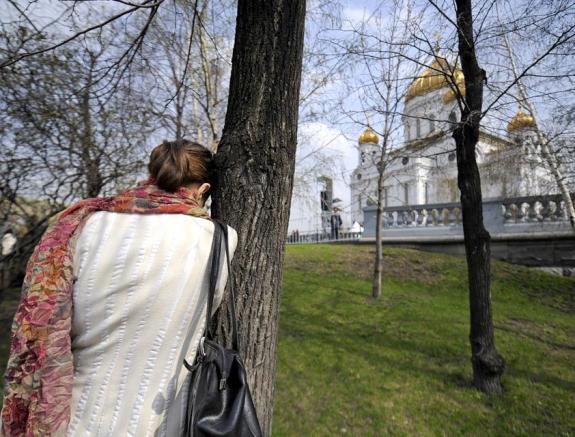Such a tragic ending after all the blasphemies is quite predictable, unfortunately. What is more surprising is that this young woman drew blasphemous icons. That they were blasphemous was well expected, however they were not just caricatures but icons specifically. It turns out, as a young girl she studied in an icon workshop which suggests that the family was fairly religious.
Apparently, the child was taught to paint sacred images, but her meeting with God did not happen. Otherwise, I cannot explain the whole series of subsequent life events. Where did such animosity against the Church and all that is holy come from? What kind of disappointment did a person had to go through that it turned her life on a dime? God knows. However, I believe it is a pretty common symptom.
There is a huge problem in education. It comes down to acquiring knowledge that is usually piecewise, and therefore seems irrelevant in life. Math is studied separately, and so are physics and chemistry, and a rare teacher can explain why all of this should be learned and how it relates to other sciences and to me personally. As a result, at school we mechanically learn a set of abstractions that do not prepare us for adulthood at all.
Sadly, tasks of the modern education do not include the development of coherent and consistent worldview. Children do not know who they are, why they are, what all of this around is for. Moreover, we were not particularly taught how to build relationships with close ones and with the rest of the world.
If a person is harmonious, then forming relationships, working, and studying will be easier for them. It is said that adults study better than young people even though their memory is worse, and they cannot specifically pull all-nighters. When a person knows what they need and why, they have a motivation to learn. So it is quite possible to get a better result with less process efficiency.
At a young age, just when we go to school or university, personality development takes place. People should find their place in the system of the Universe, but few of them find answers for themselves to questions about the meaning of life. Someone gets discouraged, someone becomes humble, and someone rebels. There are no particularly happy and calm people among young ones.
So why are these good marks needed if they do not give happiness in marriage, console after the loss of loved ones, or insure against life mistakes? They say, if you neglect schoolwork, you will not be able to get a good job. I would rather agree. However, will a good job give happiness in marriage, consolation after the loss of loved ones, and further on? Obviously, no. Knowledge is necessary and important, nobody disputes. The question is in their low-priority in relation to mundane things. Yet insisting on the importance of good marks, parents tell their child that the most important thing in life is studies and work.
This model is often transferred to religious education. Children sing, learn the Law of God, and some even learn to paint icons. Do children herewith know how to pray, or do they just memorize prayers? Do they comprehend God, or do they only abstractly perceive provisions of catechism in the same way as theorems in geometry? Do they have a reverence for divine service, or is being in church just a habit for them? Do we help them to build a cohesive worldview, or do we just give them an additional package of knowledge?
There is always a risk that all the knowledge about God, the Bible, church life will be embedded in a completely non-Christian worldview, and that will do more harm than good. People will be sure that this theoretical and, as it seems to them, detached from reality package of knowledge is indeed religion. They will hardly ever take it seriously, if not turn into its ardent foes.
First of all, one needs to learn what the right way to live is, how to act in a given situation, how to respond to betrayal, how not to be a traitor. I know wise people who have finished only three years of school education or have poor marks in the diploma. I also know those who have two diplomas of higher education but cannot determine cause-and-effect relationships and are unwilling to hear any arguments. After all, studying hard is the most important thing, and they have succeeded in this and have one school and two university diplomas with honors and a successful career as a proof of this. Many consider such achievements to be a mark of intelligence, although in reality it is just a package of accumulated information and skills.
There is no doubt that knowledge is necessary as is a degree, and it is difficult to master practice without theory, however it is by no means the most important thing in life. We often assert that the most critical things are faith or family, but in fact childish philosophy is much more powerful, and at the end of the day only the elderly and housewives are at church on the Twelve Great Feasts. Does everyone indeed have such a job that it is difficult to request leave of absence or take a half day off? Do not get me started about skipping school or university. At the same time, without any doubt we ditch work or school for other reasons that we deem quite important, even if later we must grow red and make excuses. Do not we declare by this that God plays a secondary role in our lives if one can skip work or school for anything at all but the Liturgy?
We have become accustomed to the fact that morning and evening prayers may be shortened due to exhaustion, however Saint Paisios of Mount Athos did not see it as an excuse but a fault that a person is so tired that they have to neglect communication with God. Between working and praying, one should ideally prefer the latter.
Of course, one can force oneself to attend all services and read all prayers, but it will be a mechanic action and will not be from the heart. Sooner or later you will grow to hate this very routine and God for company’s sake. I suppose it is better to admit to yourself that in fact somewhere in your heart you do not consider these things important, and therefore prefer working, social networking, or watching the latest news. And try to understand why it is so and what could be done about it.
We pay too much attention to form at the expense of content. Perhaps, you should ask yourself again the questions that were not fully resolved in adolescence: who am I? why am I? what should I do with myself and others? Hence going to church will cease to be one of the items in the to-do list and will become something what it was supposed to be from the start: a means of salvation.
Translated by Julia Frolova
















